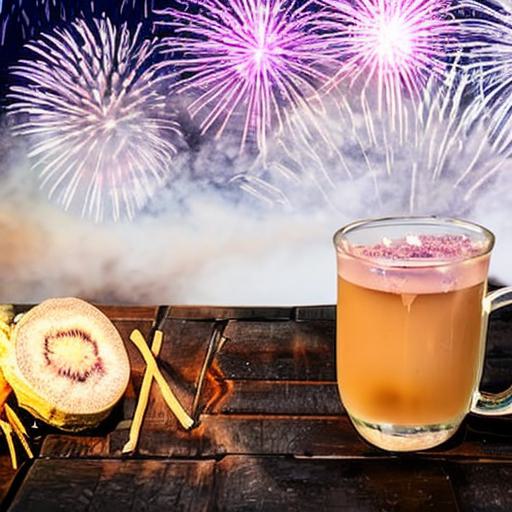Introduction
Taro tea has been gaining popularity among tea enthusiasts, leaving many wondering about its health benefits. Made from fresh taro root, this delicious beverage provides a unique and refreshing alternative tea taste. But is taro tea good for you?
In this blog post, we will delve into the nutritional value of taro root, explore its various health benefits and potential risks, and provide recommendations on how to incorporate this delectable drink into your diet in a way that best supports your well-being.
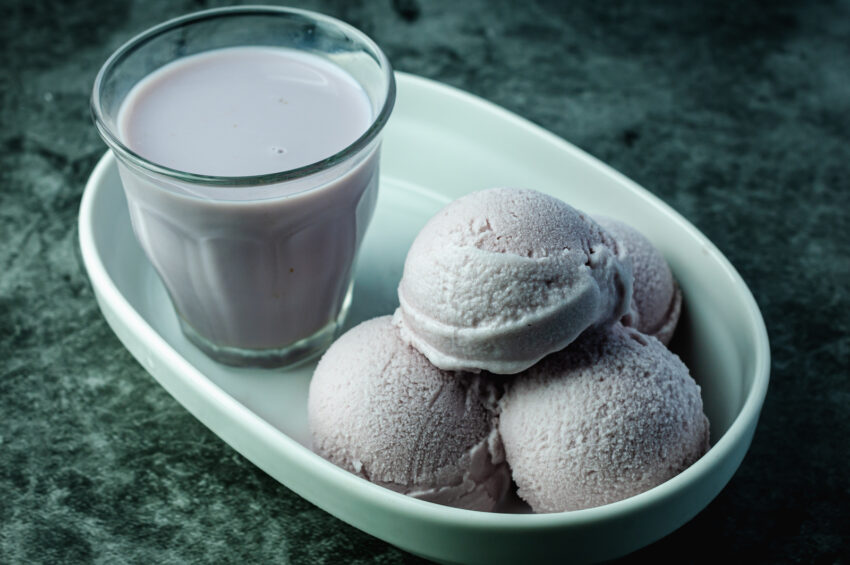
Key Takeaways
- Taro tea is a nutritious beverage that offers many health benefits due to its high antioxidant and nutrient content, including improved digestion, heart health support, and reduced risk of chronic diseases like cancer and Alzheimer’s disease.
- While taro tea is generally considered safe for most people to consume, it may pose risks for some individuals such as those with allergies or kidney issues. In addition, diabetics should be cautious when consuming taro tea due to its high carbohydrate and sugar content.
- Taro root powder contains high levels of oxalates that can contribute to the development of kidney stones. Therefore, those with a history of these issues should consume it in moderation or consult with their doctor before adding it to their diet. With proper precautions taken into account however one can enjoy all the tasty goodness of this drink without any adverse effects on their health!
What Is Taro Tea?
Taro tea is a popular drink in the United States made from the taro root, known for its sweet and nutty flavor and purple color.

Origin And Cultural Significance
Tracing its origins back to Southeast Asia, taro root has long been a culinary staple and served as a nutritious food source for many cultures across the globe.
Taro is considered one of the oldest cultivated crops in human history.
For instance, Hawaiians have deep connections with the taro plant or “kalo” as they call it – believing that it’s an ancestor and symbol of their people. Traditional Hawaiian dishes like poi are made from this versatile root.
Similarly, several Asian countries use taro in both sweet and savory recipes due to its unique flavor profile and texture. Taro tea emerged as another creative way to consume this nutritious root alongside classic bubble tea variations that originated in Taiwan during the 1980s.
Nutritional Value
Taro root, the main ingredient in taro tea, is packed with essential nutrients that can improve your overall health. This root vegetable is rich in fiber, potassium, magnesium, and Vitamin B6.
It also contains calcium, iron, and vitamins A, C, and E.
In addition to its nutritional value, taro root has a unique taste that complements the natural sweetness of tea. Unlike other drinks loaded with sugar or artificial sweeteners, a cup of taro milk tea provides a natural sweetness that won’t spike your blood sugar levels.
Taste And Caffeine Content
Taro tea has a unique taste that is sweet and nutty, with a creamy aftertaste. It can be enjoyed hot or cold and is often paired with milk or sweeteners such as honey or sugar. People try different types of kinds of milk in different flavors such as almond milk, coconut milk, whole milk, soy milk, and oat milk.
Unlike traditional teas like black or green tea, taro tea does not contain caffeine naturally. However, some vendors may add a few mg of caffeine to their taro bubble tea drinks for an added energy boost.
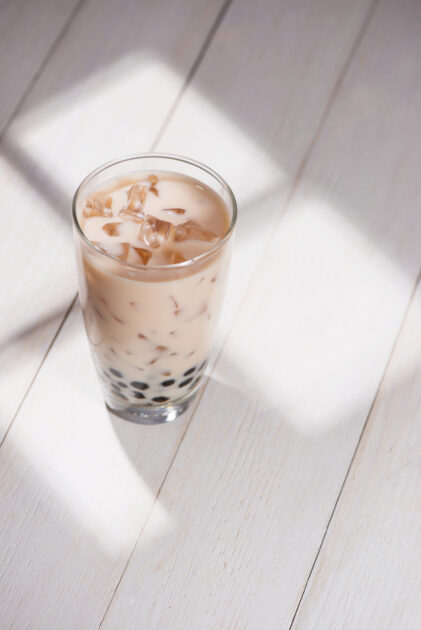
Health Benefits Of Taro Tea
Taro tea is rich in antioxidants which can provide protection against free radicals and prevent cell damage.
Rich In Antioxidants
Taro tea is packed with antioxidants, making it a healthy choice for tea lovers. Antioxidants are essential substances that protect our bodies from damage caused by free radicals, which can contribute to various health problems.
Taro root contains phenolic compounds such as caffeic acid and ferulic acid, which have potent antioxidant properties.
Regular consumption of taro tea may also reduce the risk of chronic diseases such as cancer, heart disease, and Alzheimer’s disease due to its high antioxidant content.
Additionally, taro root has anti-inflammatory properties that can support overall health and well-being.
Supports Digestion And Metabolism
Taro tea is excellent for maintaining healthy digestion and metabolism. This root has a high fiber content that aids in food digestion, prevents constipation, and eliminates waste from the body.
Moreover, Taro tea can also enhance your metabolic rate due to its potassium content. Potassium aids in breaking down carbohydrates into glucose which is used by the body as fuel for energy production.
Drinking taro tea regularly will keep your digestive system functioning effectively while also supporting a healthy metabolism.
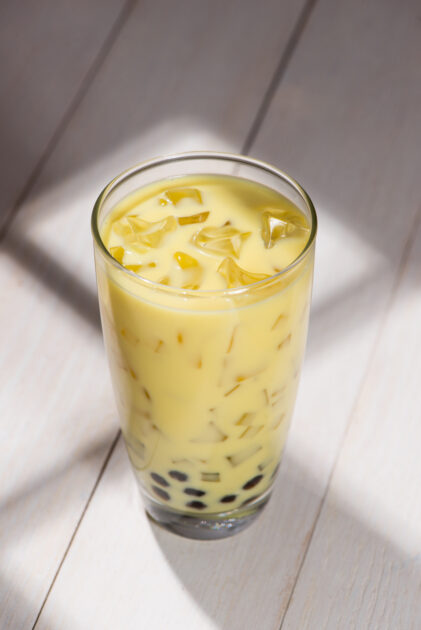
Promotes Heart Health
Taro tea has many health benefits, including promoting heart health. Taro root contains potassium, which helps regulate blood pressure and reduce the risk of stroke, as well as fiber which can lower cholesterol levels.
Additionally, taro root has antioxidants that can prevent damage to the heart from free radicals and improve overall cardiovascular health. Studies have shown that regularly consuming taro root can lead to a decreased risk of heart disease by reducing inflammation in the body and improving glucose metabolism.
Enhances Skin And Hair Health
Taro tea is not only delicious but can also enhance the health of your skin and hair. This plant-based beverage is a rich source of antioxidants, which can help fight off free radicals that damage cells and accelerate aging.
In addition to its skincare benefits, taro root consumption may also promote hair health. Taro has high levels of potassium and Vitamin B6 that aid in maintaining healthy blood circulation to the scalp promoting hair growth.
Enjoying a cup of hot or cold taro milk tea regularly as part of a balanced diet can provide you with these numerous health benefits while keeping you refreshed throughout the day!
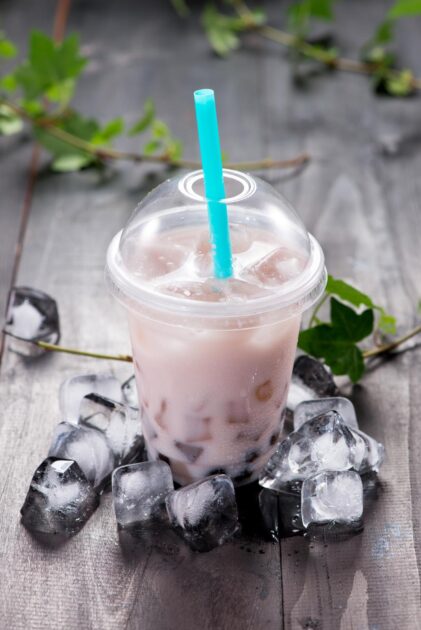
Potential Risks And Precautions
Taro tea is generally considered safe for most people to consume, but there are some potential risks and precautions to be aware of, including allergic reactions, high oxalate levels, and its unsuitability for diabetics.
Allergic Reactions
It’s important to note that some people may have allergic reactions to taro, either in its root form or as a tea. Symptoms of an allergic reaction can include itching, swelling, hives, and difficulty breathing.
Additionally, those with a history of allergies or sensitivities should consult with their healthcare providers before adding taro tea to their diet. While rare, severe allergic reactions can occur and it’s better to be cautious rather than risk potential harm.
High Oxalate Levels
It’s important to keep in mind that taro root contains high levels of oxalates, which are compounds that can contribute to the development of kidney stones.
While this doesn’t mean you should avoid taro tea altogether, it’s recommended that those with a history of kidney stones or other kidney issues consume it in moderation or consult with a doctor before adding it to their diet.
Additionally, pairing taro tea with calcium-rich foods or supplements may help reduce the absorption and accumulation of oxalates in the body.
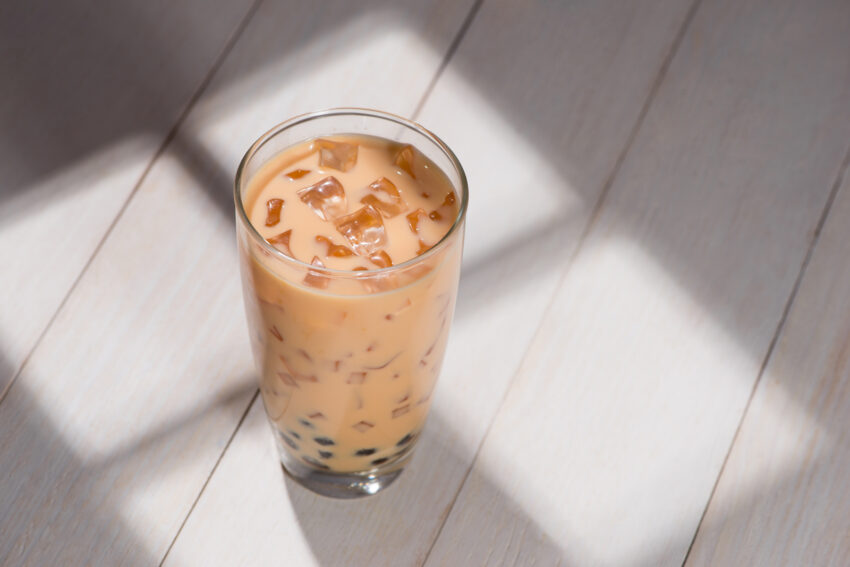
Not Suitable For Diabetics
It is important to note that taro root, the main ingredient in taro tea, contains a significant amount of carbohydrates and a large amount of sugar. This means that the best way for individuals with diabetes is to consume taro tea in moderation or avoid it altogether.
Consuming too much sugar can cause blood sugar levels to spike, which can be dangerous for those with diabetes. However, if you are not diabetic and enjoy taro tea, there are many health benefits associated with drinking it such as aiding digestive health due to its high fiber content and reducing the risk of heart disease due to its potassium content.

FAQs:
1. What are the health benefits of drinking taro tea?
Taro tea is believed to have a high nutritional value, including antioxidants, fiber, and essential vitamins such as vitamin C and potassium. It may also improve digestion and boost energy levels.
2. Is taro tea suitable for people with certain dietary restrictions?
While taro tea is generally considered safe for consumption, individuals with nut allergies or those following low-carb diets should be cautious due to its higher carbohydrate content. It’s always recommended to consult with a medical professional if you have any concerns or questions about your diet.
3. How can I make taro tea at home?
To make homemade taro tea, mix boiled water with fresh or dried shredded taro root along with your preferred sweetener (honey, sugar, or maple syrup). Let it steep for several minutes before straining out the solid pieces using a cloth or fine mesh sieve.
4. Are there any potential side effects from drinking too much taro tea?
Consuming large quantities of starchy foods like taro root could potentially lead to digestive issues such as bloating and diarrhea in some individuals. The key is moderation – enjoying small amounts regularly rather than overindulging in one sitting.*

Conclusion And Recommendations
In conclusion, taro tea can be a healthy addition to your diet in moderation with numerous health benefits such as promoting heart health and enhancing skin and hair health.
However, it’s important to note that taro may pose risks for certain individuals such as those with diabetes or allergies. Consult with your doctor if you have any dietary restrictions or concerns before adding taro tea to your routine.
Taro Tea Can Be A Healthy Addition To Your Diet In Moderation
Taro tea is a delicious and nutritious beverage that can provide many health benefits when consumed in moderation. The primary ingredient, taro root, is rich in fiber, potassium, magnesium, and various vitamins including A, C & E.
Taro root has been linked to improved digestion, heart health support, reduced risk of cancer, and assisting in weight loss. Furthermore, taro bubble tea pearls are low in cholesterol and saturated fat making it a great alternative to high-calorie drinks like soda.
However, individuals with dietary restrictions such as diabetes should consult their doctor before adding taro tea to their diets due to its high glycemic load.
Consult With Your Doctor If You Have Any Health Concerns Or Dietary Restrictions
It is always wise to check with your doctor before introducing any new food or drink into your diet, especially if you have health concerns or dietary restrictions.
While taro tea has many potential health benefits, it may not be suitable for everyone. For example, those who are allergic to taro or have a high risk of kidney stones due to its oxalate content should avoid this tea.
Additionally, diabetics may need to monitor their blood sugar levels closely as taro can raise glucose levels in the bloodstream. By consulting with your healthcare provider, you can ensure that you are making informed decisions about what foods and drinks are right for your individual needs and goals.
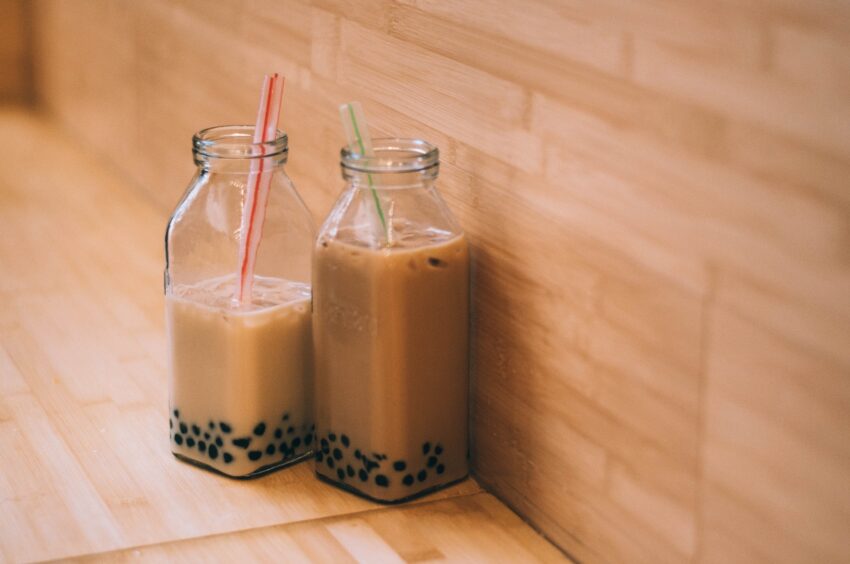
Enjoy Taro Tea As Part Of A Varied And Balanced Diet.
In conclusion, taro tea can be a great addition to your diet when consumed in moderation as part of a balanced meal plan. Its high fiber content aids in digestion and promotes metabolic health, while its low-fat and low-cholesterol properties make it an ideal option for those watching their weight or cholesterol levels. Enjoy boba tea at bubble tea shops. Add tapioca pearls (boba pearls) for a different taste.
The good news is taro root is also rich in essential vitamins and minerals such as calcium, iron, potassium, and Vitamin B6 which support overall health. It’s important to consult with your doctor if you have any underlying medical conditions or dietary restrictions before incorporating taro tea into your routine.
